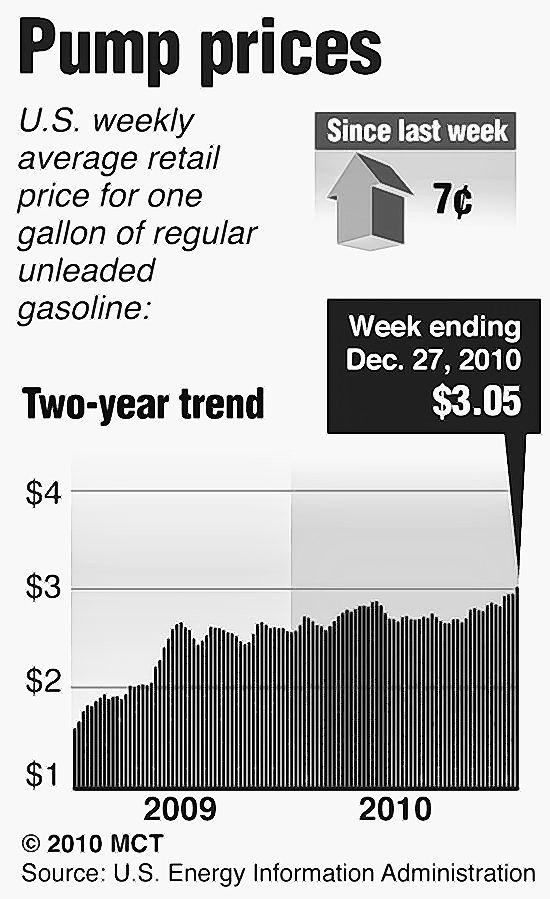CHARLOTTE, N.C. – For the first time in two years, the average gas price is higher than $3 a gallon, sucking money from drivers’ wallets and, experts worry, possibly hampering the economy’s rebound.
The national average price for a gallon of regular unleaded gasoline was $3.07 on Thursday, according to AAA’s Fuel Gauge Report, the highest price since October 2008.
That’s 42 cents higher than a year ago, and prices aren’t likely to improve significantly anytime soon. Experts offered differing predictions as to how high gas could go, with at least one analyst saying prices could hit $5 a gallon by the end of 2012.
Several factors are behind the surging gas prices, which experts said are unusual for this time of year. The recent cold snap in the United States and Europe created more demand for heating oil, which lowers production of gasoline and raises its price.
Oil is also trading above $90 a barrel for the first time since 2008, which experts say is driven by increased demand, a stagnant supply and speculative trading. The weak dollar and an explosion of new automobiles in Asia are also behind the rise.
Rising fuel costs will hurt consumers’ disposable income and could dampen the economic recovery next year, said retail consultant Britt Beemer, CEO of America’s Research Group.
“You’ll be saying, ‘Last year, I filled up my tank for $40. This year it’s costing $60,’ ” Beemer said. “You really notice that $20. Gas prices are really going to have an impact.”
Even if Americans don’t drive, they’re likely to see higher fuel costs in other places. Pricier gasoline could drive up the cost of groceries and other consumer goods — which are universally delivered by truck — and US Airways is joining some other domestic carriers in adding a $20 round-trip surcharge.
John Hofmeister, former president of Shell Oil, has predicted that gas will top $5 a gallon by the end of 2012 as supplies fail to keep up with increasing demand. He heads Citizens for Affordable Energy, a group that advocates for increased domestic energy production from all sources.
During the next year, prices likely won’t go too much higher than $3 a gallon, said James Williams, an analyst at Arkansas-based WTRG Economics.
“The Saudis don’t really see it in their best interest for oil to hit $100 a barrel,” Williams said. “That would probably add another 25 cents a gallon to it. That could easily push us into another recession.”
The last time oil prices surged above $100 a barrel, in 2008, the world economy crashed and oil prices tumbled from $145 a barrel to $45 a barrel in under a year, Williams said.
Send questions/comments to the editors.



Success. Please wait for the page to reload. If the page does not reload within 5 seconds, please refresh the page.
Enter your email and password to access comments.
Hi, to comment on stories you must . This profile is in addition to your subscription and website login.
Already have a commenting profile? .
Invalid username/password.
Please check your email to confirm and complete your registration.
Only subscribers are eligible to post comments. Please subscribe or login first for digital access. Here’s why.
Use the form below to reset your password. When you've submitted your account email, we will send an email with a reset code.